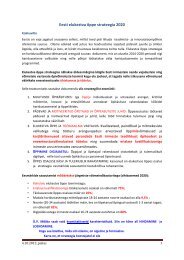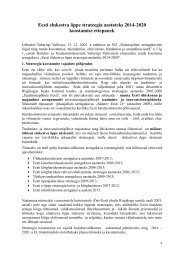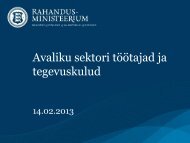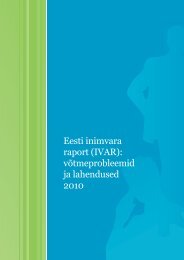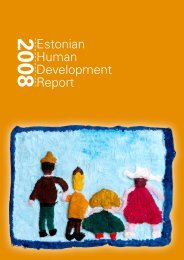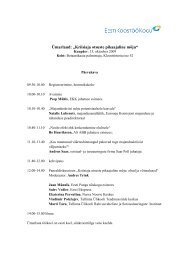DEVELOPMENT
The pdf-version - Eesti Koostöö Kogu
The pdf-version - Eesti Koostöö Kogu
Create successful ePaper yourself
Turn your PDF publications into a flip-book with our unique Google optimized e-Paper software.
Figure 2.8.4<br />
Changes releated to trust in government, Estonia and the reference states, from 2006 to 2012<br />
Estonia<br />
Czech Republic<br />
Slovakia<br />
Hungary<br />
Slovenia<br />
Finland<br />
Denmark<br />
Netherlands<br />
Greece<br />
Trust, percentage<br />
2006<br />
2007<br />
2009<br />
2010<br />
2011<br />
2012<br />
2006<br />
2007<br />
2009<br />
2010<br />
2011<br />
2012<br />
2006<br />
2007<br />
2009<br />
2010<br />
2011<br />
2012<br />
2006<br />
2007<br />
2009<br />
2010<br />
2011<br />
2012<br />
2006<br />
2007<br />
2009<br />
2010<br />
2011<br />
2012<br />
2006<br />
2007<br />
2009<br />
2010<br />
2011<br />
2012<br />
2006<br />
2007<br />
2009<br />
2010<br />
2011<br />
2012<br />
2006<br />
2007<br />
2009<br />
2010<br />
2011<br />
2012<br />
2006<br />
2007<br />
2009<br />
2010<br />
2011<br />
2012<br />
75<br />
70<br />
65<br />
60<br />
55<br />
50<br />
45<br />
40<br />
35<br />
30<br />
25<br />
20<br />
15<br />
10<br />
5<br />
0<br />
75<br />
70<br />
65<br />
60<br />
55<br />
50<br />
45<br />
40<br />
35<br />
30<br />
25<br />
20<br />
15<br />
10<br />
5<br />
0<br />
Source: Eurobarometer<br />
a loss of trust among the Russian-speaking respondents;<br />
2009 – impact of the economic crisis; 2012 – Reform<br />
Party financing scandal).<br />
Estonia’s problem is the strong correlation between<br />
the trust assessments and the ethnic background of the<br />
respondents, which reflects the different attitudes of the<br />
Estonians and the Russian-speaking minority toward the<br />
Estonian state (Figure 2.8.3). It is also noteworthy that the<br />
Russian-speaking respondents demonstrated greater trust<br />
in the parliament than in the government, but the opposite<br />
is true of the Estonians, who trust the government more.<br />
However, when comparing the changes in the trust<br />
in Estonia’s government, with that in the reference states,<br />
we see clearly that, despite the economic crisis, some<br />
governments retain the trust of the people and some do<br />
not (Figure 2.8.4). In the old democracies, the trust in the<br />
government has been declining steadily in Greece, but, in<br />
the Baltic Sea area, which is of interest to us, Denmark has<br />
turned out to be the most vulnerable. On the other hand,<br />
the ratings of the governments in Finland and the Netherlands<br />
have turned out to be consistently high, regardless<br />
of the crisis. The trust level of Estonia’s government has<br />
remained higher than that of the other new EU Member<br />
States. Initially, the rapid recovery from the crisis raised<br />
the level of trust in the government, but in the autumn<br />
of 2011, this started to decline. It is worth observing how<br />
Slovenia and the Czech Republic, which, to date, have<br />
consistently outstripped Estonia in human and economic<br />
development, and have tried to maintain a “soft line” in<br />
their reform policies, have ended up in a serious crisis of<br />
trust, during and after the economic crisis.<br />
Simultaneously with trust in the government<br />
(Figure 2.8.5), a change has also occurred in the trust in<br />
political parties, which has been lower than the trust in<br />
the government, and which declined, in many states, to<br />
below 10%, during the crisis. After the crisis, the trust in<br />
political parties increased only in Finland and Denmark,<br />
and somewhat in Slovakia and Hungary, while, at the<br />
same time, the trust in the political systems of Slovenia<br />
and the Czech Republic were not able to recover, even by<br />
the end of 2012. In Estonia, the decline in the trustworthiness<br />
of the government, compared to 2010, has been<br />
faster and sharper than the reduction in the trustworthiness<br />
of the political parties, which, until 2011, remained<br />
higher than in the other Member States.<br />
However, it can generally be stated that, regardless<br />
of the increase in public criticism, Estonia’s political<br />
system, which is based on representative democracy, has<br />
become more stable than in the majority of the other<br />
Eastern and Central European states. However, if we compare<br />
all the other European Union Members States with<br />
the problem child, Greece, the question develops, whether<br />
trust in the government, parliament and political parties<br />
has been decimated by the economic crisis, or is the reason<br />
why Greece actually cannot cope with its problems<br />
is the existence of a great deficit in social capital, and a<br />
total lack of trust.<br />
2.8.2<br />
Satisfaction with the functioning of<br />
democracy<br />
Trust in political institutions is an indication of how<br />
well democracy functions in the given state. Or, in other<br />
words, to what extent people perceive that the state<br />
authorities are capable of finding solutions to problems,<br />
while also considering the interests of various societal<br />
groups, in the process.<br />
The following percentages of the citizens are satisfied<br />
with the functioning of democracy in their states:<br />
90% in Denmark, 78% in Finland, 75% in the Netherlands,<br />
and 70% in Austria. On the other hand, 76% of<br />
Estonian Human Development Report 2012/2013<br />
97



